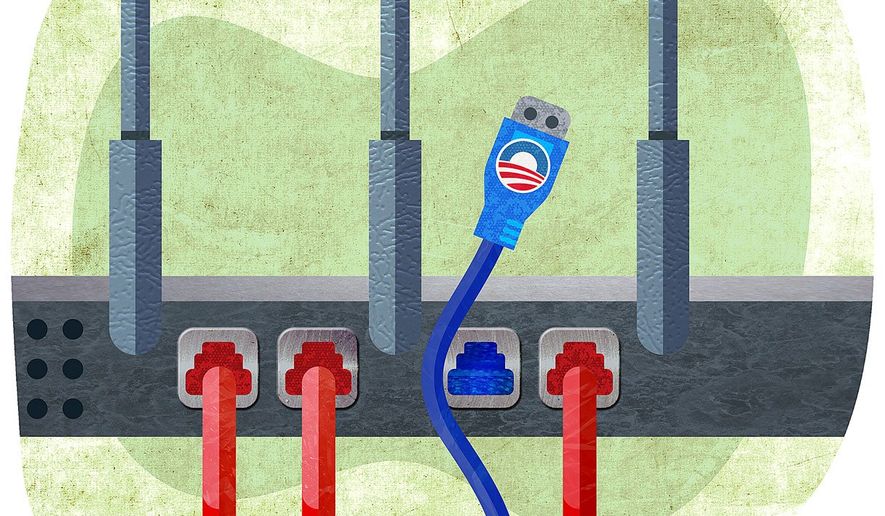OPINION:
Over the last two weeks, there has been a vigorous debate about internet regulation. Under the plan I recently proposed, the Federal Communications Commission (FCC) would restore internet freedom by rolling back heavy-handed government regulations imposed during the Obama administration. Some have tried to whip Americans into a frenzy by making outlandish claims. Feeding the hysteria are silly accusations that the plan will “end the internet as we know it” or threaten American democracy itself.
These claims obscure a pretty mundane truth: This plan would simply restore the successful, light-touch regulatory framework that governed the internet from 1996 to 2015. And importantly, it would get the government out of the business of micromanaging the internet.
Back in the 1990s, President Clinton and a Republican Congress made an incredibly important decision. They made it the policy of the United States “to preserve the vibrant and competitive free market that presently exist[ed] for the internet unfettered by Federal or State regulation.”
That approach worked wonders. The private sector invested more than $1.5 trillion to build out communications networks throughout the United States. Entrepreneurs used this open platform to start companies that have become global giants. And America’s internet economy became the envy of the world.
But then in 2015, the Federal Communications Commission took a politically motivated wrong turn. At the urging of the Obama administration, the FCC slapped on the internet the very same heavy-handed regulations developed by the Roosevelt administration to regulate the Ma Bell telephone monopoly. What has been the result? Investment in broadband networks has declined and innovation has been discouraged. That’s why I believe it is time for us to return to the successful market-based approach that governed the internet for almost two decades.
Some claim that the Obama FCC’s regulations are necessary to protect internet openness. History proves this assertion false. We had a free and open internet prior to 2015, and we will have a free and open internet once these regulations are repealed.
Some in Silicon Valley have opposed the plan, arguing in favor of imposing tough regulations on internet service providers. And I can understand why large Silicon Valley companies take this position. Saddling internet service providers with tougher regulations than apply to themselves helps them cement their dominance over the internet economy.
But is this regulatory arbitrage in the interest of the American people? I don’t think so. That’s especially true because large Silicon Valley platforms today pose a far greater threat to a free and open internet than do internet service providers. Let’s look at just some recent examples.
Twitter refused to allow Rep. Marsha Blackburn, Tennessee Republican, to promote her Senate campaign launch video because it contained a pro-life message. YouTube restricted access to many videos from noted conservative commentator Dennis Prager’s Prager University. These videos addressed a number of important issues, including a lecture from Alan Dershowitz on the history of Israel entitled “Israel’s Legal Founding.” YouTube also demonetized, or stopped placing advertising on, almost all videos by prominent African-American Trump supporters Diamond and Silk. Reddit’s CEO secretly edited users’ comments in a pro-Trump subreddit.
And just this weekend, Apple’s chief executive gave a keynote address at the World internet Conference in China. That gathering promotes China’s vision of government censorship of the internet. What did he say there? Among other things: “We are proud to have worked alongside many of our partners in China to help build a community that will join a common future in cyberspace.” That is code for a censored internet. And it should alarm anyone who believes in internet freedom. As one human rights activist put it, “The version of cyberspace the Chinese government is building is a decidedly dystopian one, and I don’t think anyone would want to share in this ’common future.’
“I could go on, but you get the point.
If these companies are truly committed to an open internet where Americans can freely access the content of their choice, like I am, it’s curious that they focus on unnecessary and harmful regulation of other parts of the internet ecosystem with little history of engaging in this kind of behavior.
I also think that it’s time to have a serious discussion about transparency. Sunlight can be the best disinfectant. That’s why the plan to restore internet freedom requires internet service providers to disclose, among other things, their network management practices. Consumers have the right to know important information about the service they are choosing to purchase and/or use. Such transparency helps markets function efficiently, allows media, legislative and public scrutiny, and deters corporate misconduct.
But what about transparency when it comes to dominant Silicon Valley internet platforms? Right now, consumers are largely left in the dark when it comes to how these companies determine what American consumers see in their newsfeeds or search results. For example, these platforms could be using algorithms that favor content with certain viewpoints, and their users would have no way of knowing that they were being manipulated in this way. Is this a problem that needs to be addressed, and if so, how? I don’t claim to have all of the answers, but I do think these are questions worth raising.
So as we think about internet policy, we should look at the entire internet economy — not single out one part of it. And our aim shouldn’t be to pick winners and losers but instead to have consistent rules of the road. These rules should promote investment and innovation, protect internet freedom, and promote the market-based vision that’s served us so well for so long.
• Ajit Pai is chairman of the Federal Communications Commission.




Please read our comment policy before commenting.